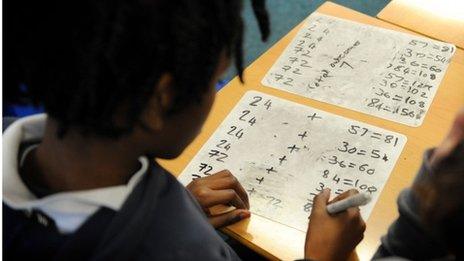Plan to tackle schools gap inspired by London Challenge
- Published
The first minister, on a visit to a school in Dundee, said the barriers to learning must be overcome
Nicola Sturgeon has unveiled plans designed to bridge the attainment gap between pupils from poor backgrounds and those from wealthier households.
The first minster's proposals will draw on schemes with a proven track record, including the London Challenge.
The scheme will be backed up by a new Attainment Scotland Fund which will provide £100m of investment over four years.
Scottish Labour has outlined a £125m plan over five years to address education inequalities.
Ms Sturgeon outlined details of the Scottish Attainment Challenge on a visit to St Joseph's Primary, Victoria Park Primary and Balgay Hill Nursery campus in Dundee.
She said it would "draw heavily" on the influence of the London Challenge which helped significantly improve school performance among poorer pupils in the UK capital.
Good practice
The new scheme will be aimed at boosting literacy, numeracy and health and well-being in some of Scotland's most disadvantaged communities.
The London Challenge was launched in 2003 by the then Labour government at Westminster with the aim of giving young people a good or better education.
It reportedly saw a dramatic rise in standards by encouraging collaboration between schools across the city.
Similar programmes were later extended further north in England and they were collectively identified as City Challenge.
Ms Sturgeon said: "We know that much more needs to be done as too many of our young people have life chances narrowed by circumstances out of their control.
"The establishment of the Scottish Attainment Challenge, backed by the Attainment Scotland Fund, signals how strongly we are committed to righting that wrong."
The first minister said her government was already working to close the gap in outcomes between pupils from affluent areas and those from deprived backgrounds.
The latest plan will see attainment advisers appointed in each local authority area.
The first minister stressed the importance of learning "not just from good practice here in Scotland, but also from elsewhere in the UK and overseas, to find ways of working that have the greatest impact".
She added: "I have been particularly impressed with the results of the London Challenge in transforming school performance in that city and so, while not all of it will be appropriate to Scottish circumstances, we will draw heavily on it in developing our own Attainment Challenge.
"We must do all we can within the powers and resources we have to narrow the gap and drive up standards at all levels."
Worst-performing schools
Scotland's largest teaching union, the EIS, welcomed a focus on tackling inequality but said that new schemes had to be backed up by adequate funding and resources.
General secretary Larry Flanagan said: "We can learn valuable lessons by looking at the successful elements of schemes from elsewhere in the UK and further afield, and adapting these to the meet the needs of Scotland's education system and its pupils.
"The London Challenge, in particular, was underpinned by substantial investment and significant increases in staffing resource to support the scheme.
"The key to tackling poverty and inequality is to step up investment in our schools while also increasing the number teachers working with pupils in our classrooms."
At the weekend, Labour leader Jim Murphy set out a £25m plan to raise attainment among Scotland's poorest children if it wins the 2016 Holyrood elections.
The party has pledged to double the number of teaching assistants in every primary school associated with the worst-performing 20 secondary schools.
It would also introduce a new literacy programme and provide extra support for pupils in each of those 20 schools.
Labour's education spokesman Iain Gray told BBC Radio Scotland: "In a modern, 21st century democracy we simply cannot sit back and accept the idea that your chances in school depend on how well-off your family is rather than anything else.
"That is something that we absolutely must begin to turn around."
The Scottish Conservatives said they had been calling for "radical reform of the school system" for decades.
- Published23 June 2014
